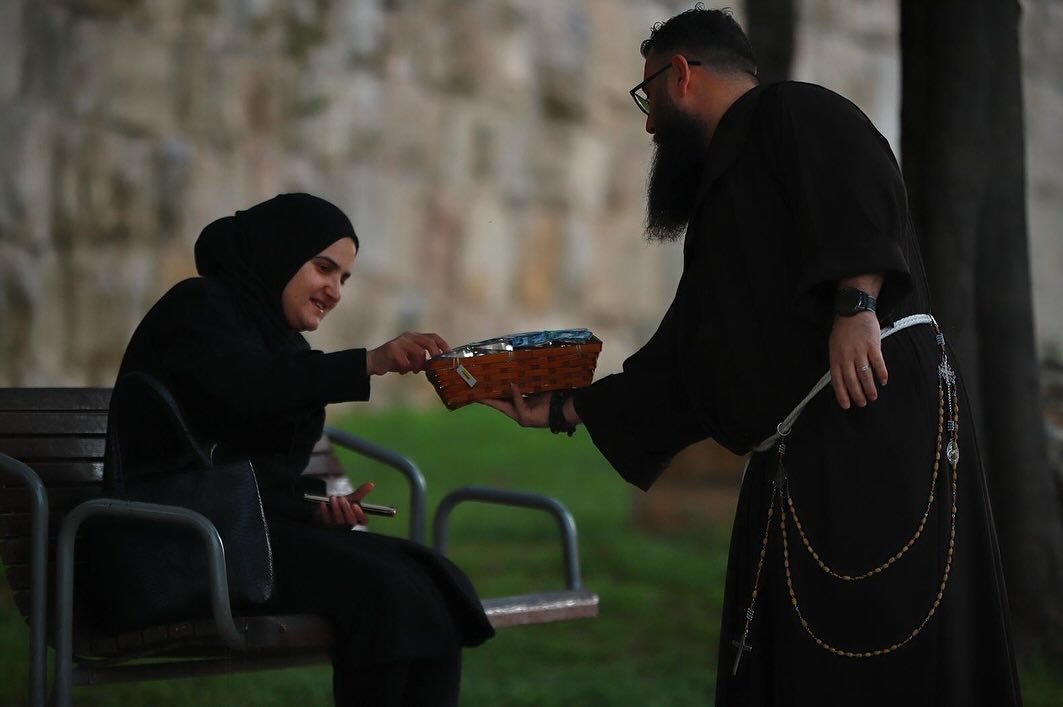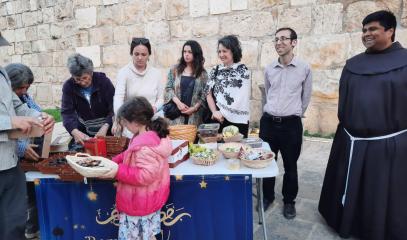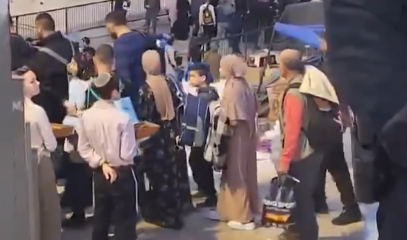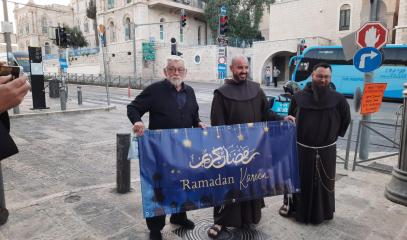Dates and water for Ramadan: A balm of 'hope' on the wounds of the Holy Land
The Custody, a Jewish group and Tag Meir activists offered gifts to Muslims leaving al-Aqsa every Thursday at the Damascus Gate. Fr. Pari: An initiative that has been carried out for some time, but this year takes on special value in the context of war. Years to rebuild relations and trust, but the role of Christians will be essential because they are the only ones who have 'forgiveness' as an intrinsic element 'of faith'.
Jerusalem (AsiaNews) - A man, of Muslim faith, after receiving dates and a glass of water "went on his way" and then turned back and "asked a friar why, what was the meaning of that gesture", to which the cleric responded by saying that it was "an attempt to give a sign of hope. Because it helps people understand that coexitnec is possible'; hearing these words, the man 'was moved'.
This small episode shared with AsiaNews by Fr. Alberto Joan Pari, friar minor of the Custody of the Holy Land in Jerusalem, testifies to the value of the initiative which takes place every Thursday of Ramadan: the distribution of fruit and bottles of water outside the Damascus Gate to the Islamic faithful who have recently concluded prayer at the al-Aqsa mosque.
"This has been taking place for some time," the cleric continued, "but, even more so this year, it was intended as a sign of trust" in a context of war in Gaza and (also) confessional violence.
It is promoted by the brothers of the Custody, a synagogue they have been working with for some time, and Hebrew-speaking Christians. Last Thursday, 4 April, Fr Alberto himself, Ilana Nelson of the Kehilat Zion Community and Tag Meir activists were present.
"This year," the friar recounts, "we had many doubts about whether to do it or not, because it could seem like a provocative gesture on the surface, but we decided to go ahead. Everyone seemed happy to receive this gesture" of peace and reconciliation.
Fr. Alberto Pari was born in Manerbio, northern Italy, in 1978 and has studies in sacred scripture and biblical archaeology at the Studium Biblicum Franciscanum in Jerusalem. A member of the Custody of the Holy Land, the religious made his first profession on 17 September 2009 and his solemn profession on 5 October 2013.
He was ordained a priest on 29 June 2015. In addition to his position as Custodial Secretary, he is Custodial Chronicler, professor at the Studium Theologicum Jerosolymitanum of Hebrew and Biblical Hebrew, editor of the Acts of the Custody, Director General of the Magnificat Institute and in charge of relations with the Jewish world, as well as being in charge of ecumenical and interreligious dialogue.
After 7 October, with Hamas's attack on the heart of Israel, there was a strong "fear that everything was destroyed" in terms of dialogue, that "what had been created over years of closeness" was lost, the cleric explains.
"And for the first month," he recalls, "it was almost impossible to meet and discuss any topic, then slowly we saw that what had been done had remained, because it was founded on solid roots".
From the the study of scripture once a month with the Jewish community to the second-hand and household goods shop promoted by Christians and Muslims, whose proceeds were donated alternately to Jewish, Christian or Islamic communities to promote festivals or events.
And again, the collection centres for Arab families who were no longer able to travel to the Jewish side for their needs, are "small examples of initiatives that can be continued", says the Franciscan, "even if it will take years to rebuild". Because, he warns, "the damage is comparable to that caused by an earthquake".
He recalls how there were already 'delicate' 'situations' before 7 October, then the terrorist attack by Hamas and the Israeli military response with the conflict in Gaza generated a complex situation of 'general fragility' of which some 'take advantage' for revenge or gain.
An example of this is what is happening in the Armenian quarter, around the dispute over the land known as the 'Cow's Garden' and in the crosshairs of the settlers. 'In recent weeks,' he adds, 'we have lived in a climate of apparent normality, but for days we have been on high alert due to the end of Ramadan and threats from Iran. Every day, every 24 hours is a journey of hope that everything will turn out ok'.
He describes Easter as "abnormal without pilgrims", but the community held "serene" celebrations and local Christians took advantage of them to "experience the holy places, which were not crowded" compared to the past.
Today, doing something together with Christians, Muslims and Jews "is almost impossible" because "trust in the other has disappeared". "There is still little awareness among Israelis of what is happening in Gaza and the local media do not help", while the population "is still locked in grief, without thinking about the reasons for what has happened".
This is why, Fr. Alberto concludes, "Christians, certainly not now that it is impossible but in the future, will play a decisive role as intermediaries between the parties. And they will have it because they have the value of forgiveness intrinsic to their faith. But in the future... now it is very difficult'.










.png)










